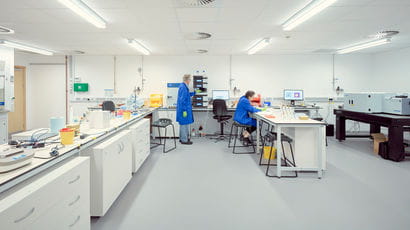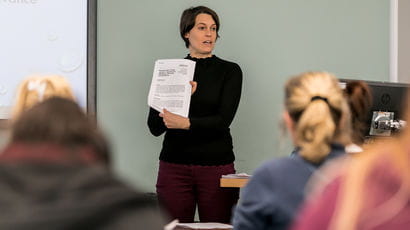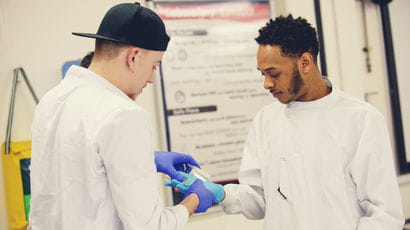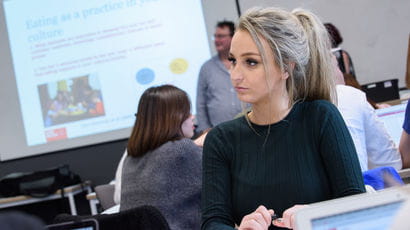Personal circumstances
Personal circumstances options available to PGRs including maternity, adoption, parental leave, reasonable adjustments and wellbeing support.
Overview
Personal circumstances are serious personal difficulties or significantly disruptive matters outside your control that impact upon your ability to:
- make progress with your research or
- meet the deadline for completing or submitting your work for a specific progression milestone or
- attend a progression examination viva voce or progress review meeting.
Personal circumstances can also apply when completing or submitting your thesis or work for final assessment or undertaking a final assessment viva voce examination, but there is special advice that you must follow for the final assessment period.
The Doctoral Academy has a personal circumstances process in place to help postgraduate researcher (PGR) candidates facing these situations. This process is not applicable for circumstances affecting any Masters level modules that PGRs may be undertaking as part of their training development credit requirements or modules being undertaken by PGRs registered on Professional Doctorate programmes.
If you have personal circumstances affecting a specific assessment for a taught module that you are taking, you will need to refer to the University’s assessment support options.
Regulations
The relevant regulations are E11.
Regulations can be viewed in full in the Academic regulations 2025/26 (PDF).
Procedures about personal circumstances impacting research study
Expectations
- PGRs are expected to engage with all submissions, progress milestones and assessment events that are required of them (for example progression examination, progress review stages two and three and final assessment viva voce examination).
- Non-submission of required work by the specified deadline without approved personal circumstances in place will be recorded as a non-submission. Where this relates to a progress milestone this will lead to loss of an assessment opportunity, and where no resubmission opportunity is available to withdrawal. Where this relates to submission of a thesis for final assessment it will lead to withdrawal and no award will be made.
- If a PGR has chosen to submit the required work or thesis and attend the progress review meeting or viva voce examination, it will not normally be possible to submit personal circumstances request subsequently.
Applying for personal circumstances
- Read the personal circumstances guidance for PGRs (PDF) and the PGR personal circumstances process diagram (PDF) to determine which option is most suitable for your circumstance. For five working day submission extensions or viva postponement, email the Doctoral Academy at doctoralacademy@uwe.ac.uk as advised in the notes. For all other options, complete the personal circumstances application form (DOC) and submit this to the Doctoral Academy with your supporting evidence.
- You will be required to submit supporting evidence for most personal circumstance applications involving a suspension from active study. Please refer to the list of acceptable supporting evidence included in the personal circumstances guidance for PGRs (PDF).
- There are different arrangements for PGRs studying on a student visa. Please see additional guidance below.
When to submit your application for personal circumstances
- You should submit your application as soon as you know that you are going to need to, for example while they are impacting your study. Please read the personal circumstances guidance for PGRs (PDF) for more information.
- It is not usually possible to submit an application for a milestone extension or a suspension of registration after the event.
- If you are submitting personal circumstances about a progression exam viva or a progress review meeting which is just about to take place (for example within four days including weekends) you must get in touch with your Director of Studies (DoS) and the Doctoral Academy as soon as possible by phone or email. This is so that examiners and reviewers can be notified, and alternative arrangements put in place.
- If you need to submit personal circumstances during the final assessment period, you must follow the procedures in the personal circumstances guidance notes about contacting the Doctoral Academy urgently. You should also read the additional guidance below.
Exceptional late personal circumstances: non-submission or did not attend viva/review
- If you were affected by personal circumstances but did not apply at the time, you may be able to apply for your personal circumstances to be taken into account on an exceptional basis, but only if you can show that your circumstances impaired your ability to make a judgement at the time about whether you were fit enough to submit your work or attend your viva or review meeting.
- Read the personal circumstances guidance for PGRs (PDF) for further information. Any application must be supported by appropriate evidence, and you must submit your application within ten working days of the submission deadline, viva exam, or progress review meeting.
How personal circumstances are considered
- Your personal circumstances application will be considered confidentially by a small panel of the designated College committee. Only the panel and designated Doctoral Academy staff will see your circumstances and evidence; this will not be shared with the wider College Committee.
- The outcome of your application will be sent to you via your UWE Bristol student email. Personal circumstances panels meet regularly, and applications will normally be considered at the next scheduled meeting of the panel. However, in very urgent cases the Chair of the panel may consider your application between meetings.
Progress milestone extension
- A progress milestone extension gives you up to a maximum of 28 days to catch up with your work and submit, or to postpone your progression exam viva or progress review meeting by up to 28 days to allow you to resolve your circumstances. It is not a reasonable adjustment and is different from a complete suspension because you are allowed to carry on working on your research.
- If your work rate has been affected by your circumstances and you can provide valid evidence to support this, then this may be the best option for you.
- Your overall active study completion date will not be extended, and neither will your subsequent milestones in later stages.
- Your fees will still be payable because you are still working, accessing supervision and other resources. Any bursary or funding will still be paid but will not be extended.
- You can only apply for this extension once per stage of your registration. This is because the extra time will be taken from the time available for your next stage. The University considers that anything more than a month would be likely to have a detrimental impact on your later progress and might ultimately impact upon your ability to complete your project on time.
- If you are an international PGR who is subject to student visa requirements, you must ensure that you remain compliant with the University’s attendance and engagement monitoring requirements.
- Before applying for this support, you need to consider carefully whether your situation will be resolved within 28 days. If your circumstances are serious or will have a longer-term impact, then a suspension may be more appropriate.
- Your DoS must confirm that they support the extension application, and you should discuss this with them before you apply.
Suspension from active study
- A suspension is a complete break from your studies because your circumstances mean you are unable to work actively on your research at all. It is a time out of more than one month and up to 12 months. Your active study completion date and any progress milestone dates along the way are moved on by the length of your suspension.
- You must provide supporting evidence with a suspension application.
- A suspension is not a reasonable adjustment and is different to a milestone extension.
- Before applying for a suspension, you need to think carefully about whether this is the best way to deal with your situation. For example, if what you really want is to catch up with work and you can be confident of getting this done within a month, then a progress milestone extension may be better for you as it may have less impact on other aspects of your studies or funding.
- It is very important to note that suspending active research study will suspend all aspects of your University registration and therefore will also suspend you from any taught modules that you are currently taking. If you are registered for a Professional Doctorate award you should discuss the impact of this with your programme leader before you suspend.
- During a suspension you should not work actively on your research, including writing up. Your DoS should remain in contact with you to see how you are but will not be able to provide more active supervision or feedback on your work.
- You can continue to access Wellbeing Service support but will not be able to access specialist mentoring support activities.
- Because you are not using resources or supervision your fees will be suspended but it is important to note that so will any bursary funding. This can result in any bursary or studentship funding that you receive running out before your revised completion date and you will be financially liable for any shortfall in fees.
- If you are in receipt of UK Research Councils funding your funder will need to be informed of your suspension by the Doctoral Academy or UK Research and Innovation (UKRI) project coordinator.
- If you are in receipt of a doctoral loan, the UWE Bristol Student Loan Company (SLC) team will need to be informed of your suspension as well as the UWE Bristol Credit Control team – this could have an impact on your loan payments, please check with Student Finance and SLC team at SLC.Enquiries@uwe.ac.uk.
- Backdated suspensions may also impact your doctoral loan and may result in immediate repayment of any overpayment you have received, please contact UWE Bristol Student Money Adviser for guidance.
- Your DoS must confirm that they support your application, and you are strongly advised to discuss your application with your DoS, and, where relevant, your programme leader, before submitting.
- PGRs on a student visa who want to apply for a suspension must also get authorised absence approval before going on suspension. You should seek advice from UWE Bristol Information points.
- Only in exceptional cases will the personal circumstances panel approve contiguous suspension applications i.e. repeat applications, one to run straight on from the other.
Personal circumstances in the final assessment period
- You are expected to make every effort to attend the viva on the date arranged and to plan ahead for most common eventualities, such as normal childcare or care of other dependents, and we encourage you to think about what alternative arrangements you might need to put in place if a dependent is ill.
- Final assessment viva voce examinations will be postponed at short notice only in the most extreme circumstances.
- If your viva is more than a week away, you should contact your DoS and the Doctoral Academy Research Assessment Team as soon as possible by phone or email for further guidance.
- If your final assessment viva voce and it is about to take place (within four days including weekends) you must contact your DoS and the Doctoral Academy Research Assessment Team immediately, without fail.
- If you cannot get through to the Assessment Team by telephone because the office is closed, then you must email Research.degrees@uwe.ac.uk with ‘Urgent, final viva personal circumstances’ in the subject line.
- You must then telephone as soon as the office re-opens (Office hours: Monday to Friday, 09:00–16:00). This is so that examiners can be contacted urgently, especially if they are external to the University and travelling long distances or coming from abroad. The Assessment Team will provide you with guidance about what to do next.
Guidance for PGRs on student visas
- Situations can sometimes arise that require some international PGRs to be absent from UWE Bristol. For example, a family emergency in your home country, a period of sickness which requires time away from studies to recover, or time required to undertake data collection or research for a dissertation or thesis.
- Authorised absences must be approved in advance by UWE Bristol’s Visa Support Team and PGRs should discuss this in advance of taking any leave. Approval is given on a case-by-case basis and must have support from an academic member of staff such as the Director of Studies. A PGR may be able to receive an authorised absence for up to 60 days but this cannot be granted in all cases.
- The authorised absence rule can only be applied if the PGR will not require a visa extension as a result of taking time out from their studies.
- There is no shame in asking for help and once we know you are experiencing difficulties, we will try to help you sort things out. You can also access advice and guidance from the Global Student Support Team.
- International PGRs can also access support from the UWE Bristol Wellbeing Service.
Guidance about reasonable adjustments for postgraduate researchers
Overview
- The University is committed to putting in place reasonable adjustments to different aspects of your study should you need them if you are:
- disabled
- a carer of a disabled person
- covered by the Student Pregnancy, Maternity, Adoption and Partner policy (PDF).
- This includes postgraduate researchers registered on MPhil and Doctoral research degree awards. Please refer to the University’s online reasonable adjustments advice.
- There is additional support available for PGRs who need reasonable adjustments for progress reviews and viva voce examinations.
- There are also arrangements for maternity, adopter, and parental leave for PGRs. Refer to the guidance about maternity and adoption and partner leave for PGRs (PDF) for more details. For some funded PGRs paid leave may also be available.
Disclosing as disabled
- The University encourages all applicants including PGRs to disclose an impairment, long-term health condition or any support needs. This information is important as it can help to identify any appropriate support that is needed before you arrive. It is essential if you require exam adjustments or wish to receive any support with your studies while you are at UWE Bristol. Please see the University’s guidance on disclosing as disabled.
- In addition, applicants for postgraduate research degree awards who have disclosed an impairment or medical condition will have an opportunity to complete a PGR access and support needs questionnaire which has additional information specific to PGR.
- When this questionnaire is returned to the Doctoral Academy, they will liaise with the University Disability Advisory service to ensure that you receive relevant advice and where appropriate are offered a telephone or in-person appointment with a disability advisor.
- You may also be invited to an informal meeting with a Disability Advisor and a member of the Doctoral Academy Team. This is so that you can access support that is relevant for both your taught modules and your research studies.
- It is useful to have your DoS present at this meeting as they will have the most regular contact with you in your day-to-day research life. However, if you would prefer that they did not attend, we will identify other ways of informing them about your support needs that you are comfortable with during that meeting.
- You can also disclose an impairment or long-term health condition as an existing PGR, either by contacting the Doctoral Academy or the Disability Service. You may then be offered a similar range of support and reasonable adjustments, but please note it is not usually possible to put reasonable adjustments in place retrospectively, relating to your active study already undertaken.
Types of PGR support available as reasonable adjustments
In addition to support you may receive for access to study and taught modules, commonly requested reasonable adjustments for PGR study can include but are not limited to:
- additional time for progression milestones – individually agreed as your research study progresses
- accessibility adjustments for PGR Researcher Development Workshops, forums and the UWE Bristol PGR Summer residential
- preparing for a viva: an initial indication of the likely range of questions or topics which the examiner will wish to discuss (although the viva may also explore other aspects or areas of your research, and you should prepare for every eventuality)
- adjustments to a viva voce room where the viva is to be held face to face (for example accessibility, furniture, lighting, proximity to a bathroom, etc.)
- adjustments to the way in which the viva is conducted.
Adjustments to a candidate's mode of study
Sometimes it is also possible to consider changes to your mode of research study as part of your reasonable adjustments and these can include:
- Switching from full-time to part-time study is available to most PGRs at any time as long as funding arrangements or research council requirements permit this. This provides 18 months between progress milestones instead of 12 months and an adjustment to your active study period end date. However, you should note that a part-time mode of study is not normally available to PGRs who are subject to student visa requirements.
- In exceptional cases switching to a more flexible version of part-time study with more time between progress milestones if you have tried standard part-time study and it is not suitable. This enables you to continue to work through your project at a pace that suits you. We call this part-time stretched and typically it might provide up to a 24-month gap between progress milestones.
- Consideration for part-time stretched mode involves discussion about what is reasonable, practical and viable before it can be approved and it may not always be possible. It will require full agreement between you, the DoS and the Doctoral Academy/College. Part-time stretched is normally considered only once you have passed your progression examination as this ensures your research project is viable and can be completed as a doctoral award. If you are considering part-time stretched mode please contact the Doctoral Academy.
Guidance about maternity and adoption and partner leave arrangements
University policy on pregnancy, maternity and adoption
The University is committed to the following principles in its treatment of pregnancy, maternity, and adoption as it relates to students including PGR candidates:
- Students will be supported throughout the period of pregnancy and maternity or adoption and, wherever practicable, will not be unreasonably prevented from applying for, registering upon, or successfully completing a programme of study.
- All reasonable steps will be taken to avoid less favourable treatment of pregnant students and students in a period of maternity or adoption. The degree of flexibility shown is likely to vary between programmes of study because of their differing requirements.
- The health and wellbeing of students will be always considered of paramount importance.
PGR candidates should refer to the University policy for student pregnancy, maternity and adoption (PDF), as they are eligible for the same support arrangements as for all students. Where the University policy refers to a programme leader’s health and safety risk assessment, this will be the responsibility of the PGR’s DoS for MPhil, PhD and DPhil awards.
PGR maternity, adoption, and partner leave
The Doctoral Academy has produced guidance about maternity and adoption and partner leave for PGRs (PDF) and current eligibility for maternity or adopter pay for some funded PGRs – a summary of the document is provided below.
Summary of leave arrangements
All ‘Home’ PGRs (full time and part time)
If you are a UK National or otherwise qualify for UK home student fees.
- Up to 52 weeks maternity or primary adopter leave if the expected week of childbirth or placement of the child will occur during the period of registration on the award. The earliest maternity leave can commence is 11 weeks before the expected week of childbirth.
- Where eligible, up to 50 weeks unpaid parental leave to be completed within 12 months of the birth or placement of the child, to be taken in up to three blocks or all at once. Eligible PGRs are those who are the second parent/will share primary responsibility for the child with its birth mother, or with the primary adopter.
- In all cases maximum active study end date to be extended by the number of weeks taken.
- If you suffer a stillbirth or miscarriage after the 24th week of pregnancy, you will still be entitled to the maternity leave. If a stillbirth or a miscarriage happens before the 24th week of pregnancy, there is no entitlement to maternity leave. However, you may wish to consider suspending your registration during this difficult time, and all such requests will be treated with the utmost confidentiality and sensitivity. Please get in touch with the Doctoral Academy.
- An individual PGR may take either maternity/primary adopter leave, or unpaid extended parental leave as relevant, not both.
- PGRs who are the partner of the birth mother or primary adopter, will be entitled to up to two weeks leave to be taken within 56 days of the birth or placement. Their next progression milestone will be extended by two weeks, and correspondingly two weeks will be added to their maximum active study end date.
International PGRs with student visas
- International students with student visas who become pregnant during their studies must seek up-to-date immigration advice promptly from a UWE Bristol Immigration Adviser. Students cannot extend their visa for reasons relating to pregnancy or maternity, and the maximum period of approved authorised absence will be considered on an individual basis in line with UK Visa and Immigration Authority (UKVI) regulations. In all cases, the University’s legal responsibilities in relation to the sponsorship of international students under the points-based immigration system will have to take precedence.
Other wellbeing resources and help for postgraduate researchers
Staying physically and mentally healthy during your research studies will help you to enhance productivity, reduce sickness and avoid unnecessary absences from your research studies. The sections above in this part of the handbook outline what to do if you do become ill and cannot work on your research or need more time to meet a progress milestone submission deadline.
There are further options available if you do not want to suspend your registration or apply for personal circumstances. If you are feeling stressed, anxious, depressed or have another ongoing mental health condition a variety of support options are available to you. The Wellbeing Service provides support 24 hours a day and at weekends including urgent and serious concerns.
The Wellbeing Service is a confidential service and is unable to discuss whether a student is accessing the service unless they have the student’s consent. Any DoS, supervisor or other member of staff who has urgent concern about a PGR can call the Serious Concerns line on +44 (0)117 32 84000 any time (day or night), to speak to the Duty Wellbeing Manager and pass on their concerns. Anyone can call this number, including students, staff, family members and carers.
Doctoral Academy Handbook sections

Introduction
Read an introduction to the UWE Bristol Doctoral Academy Handbook.

Research degree awards
The different postgraduate research awards available and the qualification descriptors they align to.

Student registration
The registration process and periods of active study for postgraduate research degrees.

Professional development and training requirements
Professional development and research training requirements for postgraduate researchers.

Supervision
The role and responsibilities of the supervisory team for postgraduate research.

Research project
The confirmation of the research project (CP1) is where arrangements for the start of the project are confirmed.

Research governance
Research governance for postgraduate research degrees, includes ethics, research data management, intellectual property, conduct and assessment offences.

Personal circumstances
Personal circumstances, reasonable adjustments and other support available to postgraduate researchers.

Progression examination: stage one
The progression examination viva and report submission.

Progress review: stages two and three
The progress review, options for evidence of progress and eligibility for the completion period.

Final submission
Requirements for preparing and formatting the final submission for Doctoral or MPhil level research awards.

Examiners
The University’s expectations of postgraduate research degree examiners and Independent Chairs.

Final examination
The final assessment for Doctoral or MPhil level awards by research.

Higher doctorates
The regulations and processes for eligibility, consideration, submission and awarding of higher doctorate awards.
